The best rural noir transports us and traps us in a place with people who are also trapped there by lifetimes of trouble, poverty, obligations, kinship, or an inability to see beyond the next hilltop. In these stories the people are inseparable from the land and its history. Although their challenges are crushing and their luck ran out generations ago, there seems to always be a glimmer of the persistent human spirit. It’s regional literature, which is our most universal because the author’s lens can focus fully on the culture, context, ethical code, history, and beliefs of people and the land that shapes them.
A few of these books might appear on anyone’s rural noir list, but I’m also hoping to stretch the genre’s definition a little here, going so far as to include In Cold Blood, which despite being nonfiction borrows all the fictional techniques. I can’t imagine going on a rural noir jag without reading it.

The World Made Straight, Ron Rash
Seventeen-year-old Travis Shelton has few prospects outside bagging groceries at the store in town and picking tobacco for his abusive father until one day he’s walking through the woods and happens on a crop of marijuana. He steals some plants and sells them to a local drug dealer for a nice payout—enough to cover the insurance on his battered pickup for a couple months. When he goes back to swipe more plants he steps into the jaws of a bear trap and for the next hours drifts in and out of consciousness until he’s released by the shrewd and vicious farmer who set it. The lives of these three people are now knotted together in a story so tense it won’t release you. Harrowing, intelligent, and utterly convincing. Rash’s North Carolina mountain vernacular transports us to this place, these hills, and these people who still live with clan divisions carved out in a Civil War massacre.

American Salvage, Bonnie Jo Campbell
Despite the world of trouble that these rural Michigan characters can’t seem to escape—despite poverty, sexual abuse, drugs, violence, broken families, broken bodies, and the daily struggles that become the focus of their lives—Campbell’s searing short stories in American Salvage burrow deeper to explore these characters’ unexpected strength and perseverance. It’s as if Campbell takes the brutal conditions for granted—as the characters themselves do—and unearths the spirit hidden beneath, “the way a fire you thought was out sometimes left a spark that could rekindle and burn a house to the ground.”
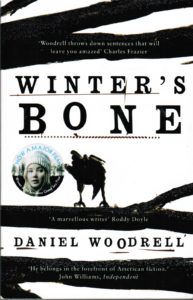
Winter’s Bone, Daniel Woodrell
Ree Dolly is a powerful and inspiring heroine relentlessly searching for her father before his next court date; if he doesn’t show up, she’ll lose the house where she’s raising her two young brothers and caring for her mentally ill mother. But the clannish Ozarks protect their secrets with violence and treachery and Ree has to draw on her fierce strength, her competency with guns, and her fearlessness and determination to keep up the search. Woodrell’s language is to be savored, a sort of sensory explosion in your mouth: “Ree’s grand hope was that these boys would not be dead to wonder by age twelve, dulled to life, empty of kindness, boiling with mean….The rough Dollys were plenty peppery and hard-boiled toward one another, but were unleashed hell on enemies, scornful of town law and town ways, clinging to their own.”
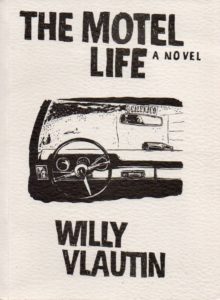
The Motel Life, Willie Vlautin
Two brothers are on the run after one of them accidentally hits a boy and kills him with his 1974 Dodge Fury. The brothers, absolutely luckless with permanent hangovers, make a rough plan for their road trip, but nothing goes right. It’s a moving story of rock-bottom motels, prostitutes, and sour-smelling bars told in an understated, bleary-eyed voice. Many have noted there are strains of Bukowski, Carver, and Dennis Johnson in The Motel Life, which is true, but I also hear the mournful melody of a Richmond Fontaine song (Vlautin’s renowned alt-country band), and its undercurrents of compassion and hope.
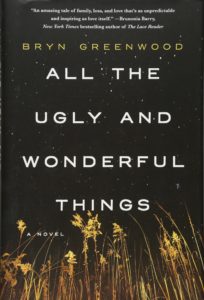
All the Ugly and Wonderful Things, Bryn Greenwood
Set against the backdrop of meth dealers and their thugs, poverty, alcoholism, broken families, and abuse, Greenwood’s novel is ultimately about how people care for each other in such a harsh and corrosive environment. In this slowly unfolding love story, we gasp at the developing relationship between a girl and a (much older) young man, but at the same time recognize its inevitability. The book is provocative, unsettling, and honest, and much of its success lies in Greenwood’s ability to make us feel the genuine love between these two so powerfully that we suspend judgment.
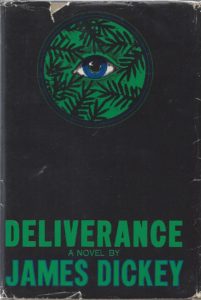
Deliverance, James Dickey
Although much of what we call “rural noir” concerns itself with the harsh lives of people in remote places and their conflicts with kin or rival clans that go back generations, Dickey’s Deliverance brings four suburban outsiders into the Georgian wilderness where they face off with a landscape and culture like nothing they know. It’s supposed to be a weekend canoe trip down a gorge that will soon be flooded for a reservoir, but once they’re in the gorge with nowhere to go but downstream, they’re attacked by sinister mountain men and their adventure becomes a fight for their lives. The story is riveting and fast-paced and reveals the deadly survival instincts concealed under our modern sensibilities.

The Sweet Hereafter, Russell Banks
Banks’ territory is rural and small-town New Hampshire and upstate New York, and the instability at the heart of many of his books stems from the wholesale abandonment of family as a basic social structure. This is the case in Affliction where the cycle of violence passed through generations devastates families, and in Rule of the Bone where a broken and abusive family jettisons a teenaged boy out to live on his own. The Sweet Hereafter begins with a school bus accident in which fourteen children are killed. In a small town where dreams and opportunities are few, the loss of their children is too much to bear and a search for moral responsibility stirs up anger and blame. “This is not bitterness,” the father of two dead children tells us. “It’s what happens when you have eaten your bitterness.”
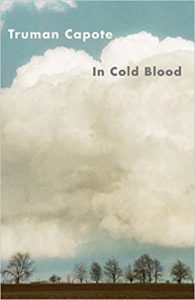
In Cold Blood, Truman Capote
Capote called the book a “non-fiction novel,” his account of the brutal murder of the Clutter family in Holcomb, Kansas, which “stands on the high wheat plains…, a lonesome area that other Kansans call ‘out there.’” It’s an absolutely gripping story in part because Capote uses so many novelistic devices. The writing and descriptions are precise and detailed and the drama is tightly constructed so that the facts of journalism are revealed along with the tension, characterization, and suspense of a novel. Though the killers are savage, Capote manages to dredge up their complexity and even their humanity, such as when Perry places a pillow under one of the victim’s heads to make him more comfortable minutes before killing him with a shotgun blast.

















